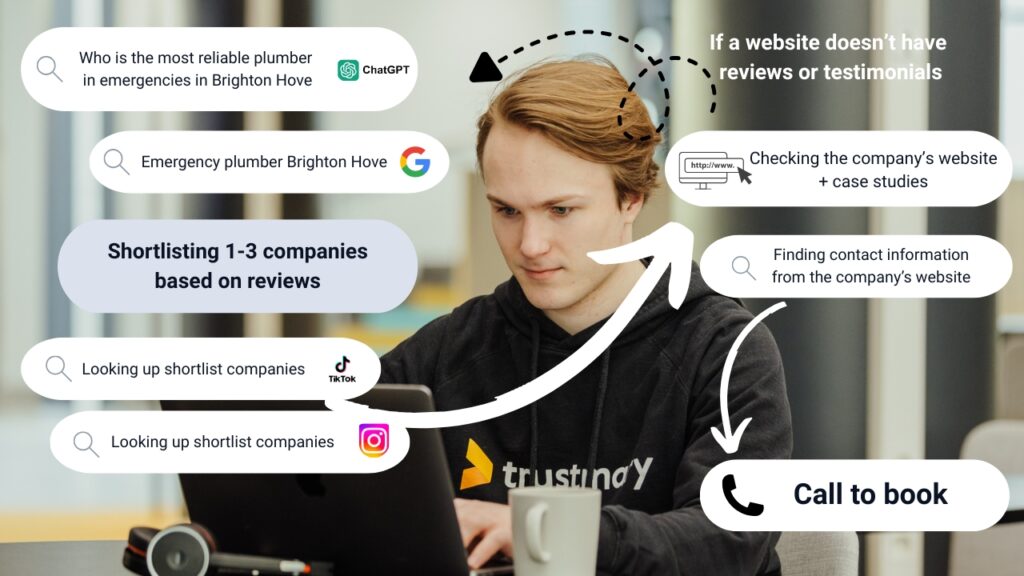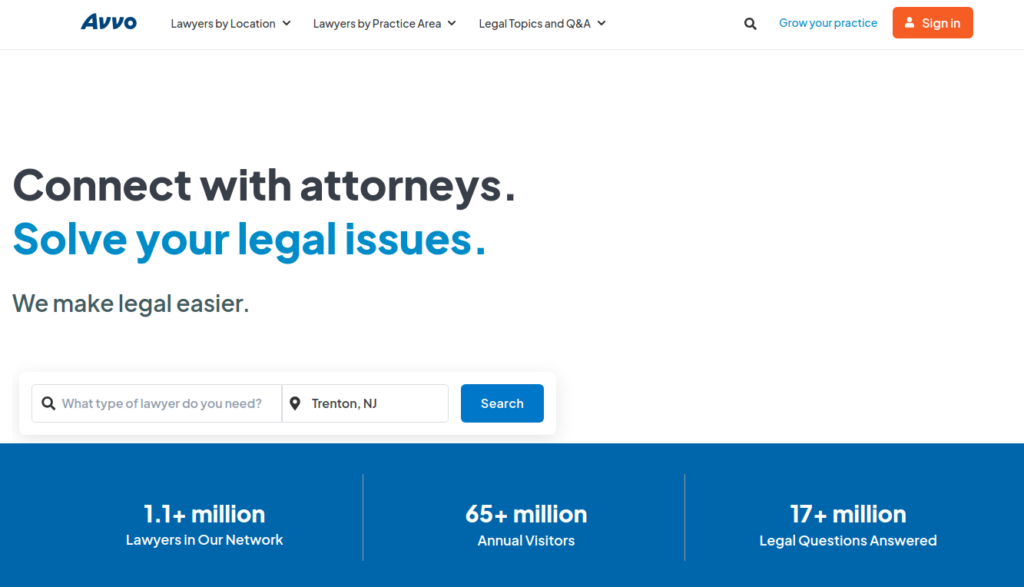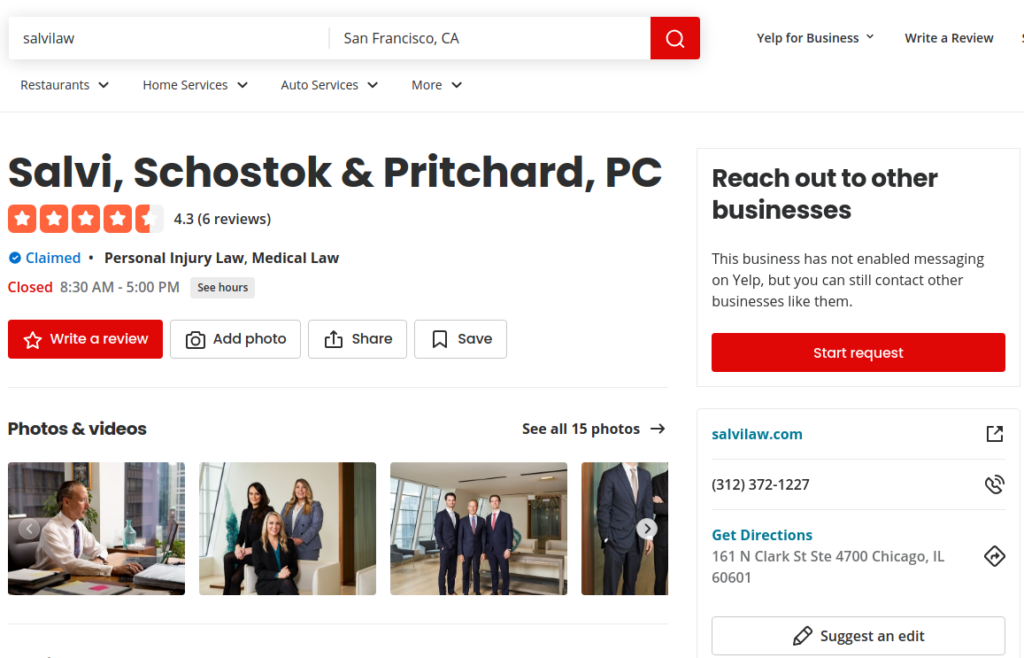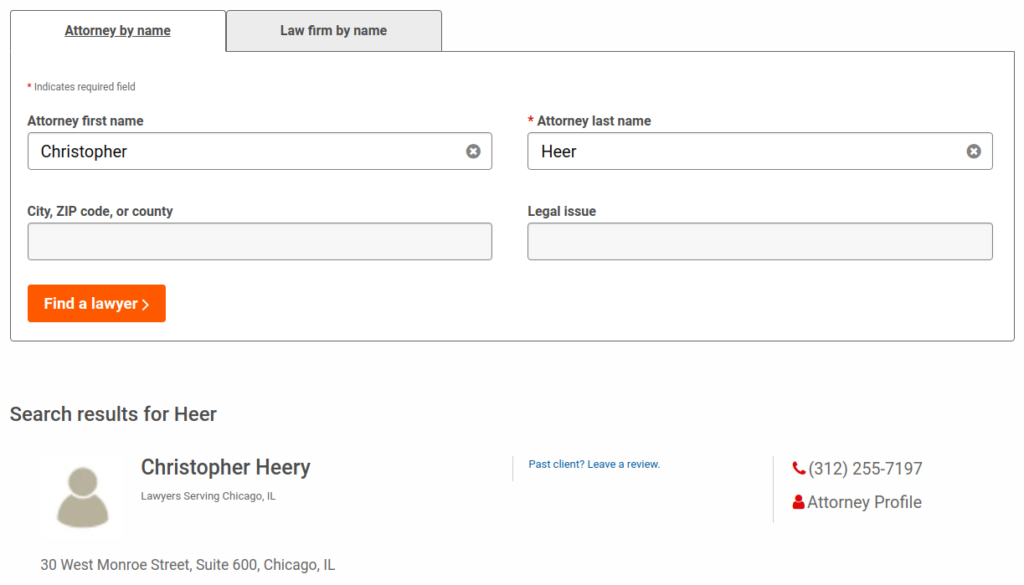Top 10 Lawyer Reviews Websites to Boost Your Reputation


Credibility matters in legal services. Clients seek assurance that they're choosing the right firm or lawyer for their needs, making reputation an essential component in building a successful practice. So, the best thing you can do for your firm is to work on building up your reputation.
In today’s chronically online world, one way to do this is by making sure your company’s name appears on some of the most popular lawyer review websites.
The reviews on these platforms are more trustworthy than the testimonials on your own pages because they act as an independent third party. Customers come here to give their honest opinions, whether positive or critical.
In this post, we'll dive into some standout review platforms that connect legal professionals with those in need of services. So, if you want to increase your firm’s visibility and build trust with potential clients, keep reading.
The Impact of Online Reviews on a Lawyer’s Practice
Online reviews, especially positive ones, are powerful tools for any lawyer's practice. They build trust and credibility, assist in attracting and retaining clients, and enhance online visibility.
Building Trust and Credibility
Positive reviews are practically endorsements from satisfied clients. They show potential clients that your firm consistently delivers quality service, which is why it’s important to encourage happy clients to share their experiences.
Today’s customers tend to glaze over ads and other promotional materials, and they trust peer recommendations more. According to a recent survey, 79% of consumers trust online reviews as much as personal recommendations.
Client Acquisition and Retention
You can harness the power of reviews to grow your business and to reassure existing customers that your service continues to be top-notch.
A potential client scrolling through options will likely pause at firms with strong review histories filled with detailed accounts of successful outcomes or exceptional service. These testimonials create a reassuring sense of reliability before the first consultation even occurs.
For existing clientele, seeing consistent acknowledgment can reaffirm their choice of your services when renewal time rolls around or if additional legal assistance arises down the line.
SEO and Online Visibility
Online reviews also have a powerful influence on your online presence and search engine rankings, especially in local searches. When someone looks for legal services nearby, search engines consider both the number and quality of reviews to determine which firms appear at the top.
However, where these reviews are posted also matters. For instance, a review posted on specialty platforms like Justia or FindLaw holds more credibility than a review posted on your website or social media account. And we haven't even talked about first-party reviews!
- Justia is particularly effective for boosting SEO due to its comprehensive attorney profiles and vast legal information repository. It acts as a magnet for web traffic searching for legal expertise or specific law-related queries.
- FindLaw provides a different advantage through its focus on connecting lawyers with consumers seeking help. Its platform includes blogs and articles that add contextual relevance to your profile - enhancing both credibility and discoverability online.
When you integrate these platforms into your marketing strategy alongside cultivating positive reviews, it sets off a ripple effect: higher rankings lead to more clicks, which attract new clients actively looking for reliable legal assistance right when they need it most.
Since the emergence of AI search engines in 2025, search behaviour has experienced a massive shift.
Online visibility relies heavily on knowing how to optimize for AI searches. Luckily, it's literally the same as doing good SEO.

Ethical Considerations and Legal Compliance
Since law firms and lawyers work with sensitive information, customers are not always willing to open up about their experience, whether positive or negative. This is why, when you ask for feedback, you must consider the ethics and legalities involved.
For once, it’s crucial not to pressure clients into writing favorable reviews or incentivizing them with rewards, as this can compromise feedback authenticity. Also, replying to critical reviews is tricky since you can’t breach client confidentiality.
Additionally, certain jurisdictions regulate how testimonials are used in marketing materials. So, before you do anything, familiarize yourself with rules set by state bar associations concerning advertising practices through testimonials.
Criteria for Evaluating Lawyer Review Websites
In our search for the best lawyer and law firm review websites, we considered several key criteria, such as:
- Demographics
- Review quality
- Verification process
- Ease of use
- Cost
These factors helped us select platforms that can help you boost visibility, increase credibility, and get more reviews.
Here’s why they matter:
User Reach and Demographics
The size and relevance of a platform's user base matter significantly. A large pool increases visibility, but relevancy is also crucial. So, sites with a substantial audience likely interested in legal services are always the best option.
Additionally, consider whether the platform's users match your practice’s demographic profile. Are they in the right geographic area or field of interest?
The idea is to make sure your online presence is reaching people who are genuinely looking for your expertise.
Review Quality and Verification Processes
Reviews are a powerful tool for brand promotion and reputation management, so companies invest a significant slice of their marketing budget in getting more positive opinions. More often than not, how they get it doesn’t matter as long as it produces results. This is why around 30% of online reviews across all industries are fake.
Therefore, making sure your reviews are authentic is crucial. Choose platforms known for their stringent verification processes that filter out fake reviews effectively. This adds an extra layer to your trustworthiness and credibility, as customers are more likely to take verified reviews as truthful.
Ease of Use
No customer, no matter how happy with your services, will take more than 5 to 10 minutes to post a review. So, a reviews website that’s not easy to navigate will negatively impact the number of testimonials you get.
The best platforms offer intuitive navigation and are mobile-friendly to cater to today’s on-the-go lifestyle.
Additional Features and Integration
Some review platforms offer premium features like analytics, integration capabilities, and marketing tools. These extras are great for tracking trends in client feedback and offering actionable insights.
There are also platforms, like Axiom Law, that act as intermediaries between clients looking for legal support and lawyers and law firms. This is a great way to increase your practice’s visibility in front of a wide range of high-quality leads. In such cases, reviews are your ultimate tool to differentiate from the competition.
Cost and Subscription Options
You might be tempted to go for the free option, which is not necessarily a bad option, especially if you have a smaller practice. However, free usually means limited functionalities.
Paid subscriptions, on the other hand, unlock advanced features like detailed reporting or personalized support, which are valuable assets when you want to maximize your online presence.
So, the best way to decide whether to go for a paid subscription is by weighing what you gain from enhanced services against the investment required.
Top Lawyer Review Websites
Using the criteria mentioned above, here are some of the most outstanding platforms that can help you get your reviews and reputation management in check.
Avvo
Avvo stands out with its comprehensive ratings, Q&A forums, and detailed legal guides. Lawyers can interact directly with potential clients by answering questions and sharing expertise.

Firms like Vaughan & Vaughan effectively utilize Avvo to boost visibility and credibility. However, some attorneys feel constrained by the platform's strict review policies.
Martindale-Hubbell
Martindale-Hubbell boasts a storied history in the legal field, offering peer-reviewed ratings that enhance professional credibility. The system benefits lawyers by showcasing their standing among peers, an invaluable asset for reputation building.
You can leverage this recognition to assure clients of your expertise and commitment to ethical standards.
Google My Business
This free-to-use platform is pivotal for your firm’s local SEO efforts. By optimizing your practice’s profile here, you improve visibility on search results like “lawyers near me” or “personal injury law firm in X location.”
Customers can also leave reviews that show up in Google search before a customer even clicks on your link. These features and more make Google My Business an indispensable tool for drawing nearby clientele effectively.
Yelp
Ever since 2004, Yelp reviews have been the go-to online location for people who want to check a business’s rating. The platform prides itself on showcasing authentic experiences, and many law firms use it to boost their reputation.

Law firms like Salvi, Schostok & Pritchard effectively use Yelp to maintain a strong local presence and connect with potential clients through honest feedback.
Justia
Justia caters specifically to legal professionals who want to connect with people in need of legal advice and students looking for research resources and practice opportunities. The platform offers comprehensive profiles and legal directories categorized by specialty that enhance visibility among peers and potential clients alike.

Respectable law firms, like the Bradley Law Firm, leverage Justia's features to showcase their expertise and connect with a targeted audience seeking specific legal assistance.
Lawyers.com
Lawyers.com integrates with Martindale-Hubbell, offering dual benefits of peer-reviewed credibility alongside user-friendly searchability for potential clients. The site provides valuable resources like guides and Q&A sections that improve the overall user experience.
Trustmary
The Trustmary platform is a bit different as it offers you the tools to proudly display and collect reviews.
You get a dynamic review widget that aggregates your practice’s reviews from various platforms and displays them directly on your website. This can be a great SEO boost and a way to ensure visitors see all the glowing reviews, not just the ones on a specific platform.
This process is called review syndication, which can be highly beneficial in case your reviews are scattered across review sites.
Additionally, Trustmary also offers tools to automate the feedback collection process, enabling firms to gather authentic client reviews effortlessly. This seamless integration boosts credibility and helps attract new clients by highlighting positive experiences.
They'll also help you create CTA widgets that feature customer reviews.
Below's an example of CTA button in action.
FindLaw
FindLaw features an extensive legal directory that allows customers to search based on their legal issues, location, and other factors. This way, customers can find firms like Heer Law that offer services pertaining to intellectual property without having to invest too much time and effort.

The platform's comprehensive resources help lawyers build visibility and establish authority within their respective fields.
Other Noteworthy Platforms
Platforms like Super Lawyers and even Facebook also deserve a mention. Super Lawyers stands out due to its rigorous selection process. Getting your practice in their directory boosts credibility and significantly enhances your professional reputation among peers and clients.
Facebook, with its massive user base, offers unique engagement opportunities. Its business pages allow you to interact directly with potential clients via posts, messages, or reviews. Additionally, the platform’s targeted advertising tools are amazing for reaching specific demographics effectively.
How to Choose the Right Review Platform for Your Practice
Now that we’ve given you a bunch of websites where you can proudly display your existing testimonials and get new ones, which ones do you choose? It all depends on who you want to attract, how much you want to invest, and your location.
Understand Your Target Audience
The main purpose of creating a profile and asking customers to leave reviews is to reach and engage with potential clients.
For this, you have to take three steps:
- Build the profile of your ideal future customer. Factors like economic and social status, location, age, political preferences, and others are important.
- Identify where they are more likely to spend time online. Whether they’re on Facebook or tend to search everything on Google, you need to know.
- Align these sites with your practice’s specialty and client base. For instance, if you specialize in family law, look for platforms that attract clients seeking those services specifically.
Run a Cost-Benefit Analysis
Some of the platforms we listed offer both free and premium versions. So, you have to decide whether the boost in visibility or extra features (included in the premium versions) provide enough value for the cost.
Assess what each platform provides and match it with your objectives. If available, take a trial period or a limited subscription to gauge the platform's effectiveness before committing.
Consider Your Practice Area
Some review sites, like Google My Business, use your location to define an area of action, so you can use them to find local customers. Others cater specifically to certain legal specializations better than others do.
For instance, platforms focusing on corporate law may not serve a criminal defense attorney as effectively. So, design your strategy around aspects that allow you to be selective of your audience.
Managing and Responding to Online Reviews
Reviews are not always positive. In fact, people who have a complaint are more adamant about leaving a review, which is not necessarily a bad thing. It allows you to learn about what you can improve and publicly show you know how to handle criticism and mitigate conflict.
Here are a few tips on how to go about everything.
Soliciting Positive Reviews
Yes, most customers need a polite nudge to share their positive experiences with your practice. But, if you choose the right moment and make it incredibly easy, they will grace you with a glowing review.
So, when’s that right moment? Usually, after a successful case or when a client expresses satisfaction. If they communicate verbally or in writing that they’re happy with your work, that’s the perfect time to send them a review link.
The good news is that you can completely automate this process. Platforms like Trustmary offer tools that automate requests efficiently without becoming intrusive. These tools can schedule follow-ups and guide clients through leaving detailed, authentic reviews with minimal hassle.
Responding to Negative Feedback
Negative reviews are not the end of the world – they are a reality every professional has to deal with. The secret to going out unscathed of this potential setback is to be professional and find a way to turn it into an opportunity for growth.
Start by remaining calm and objective. Respond promptly, acknowledging the client's concerns without being defensive. To show you value their opinion and are committed to addressing issues, thank them for their feedback.
Keep responses concise and focused on resolving the situation. Avoid debating points raised in the review and offer a direct line of communication so you can discuss further details privately.
Besides being unpleasant, negative reviews offer valuable insights into areas you may need to improve. So, use them as a springboard for change by analyzing recurring themes or specific criticisms that highlight service gaps.
Monitoring and Leveraging Reviews
Reviews show you what your customers think about your services. So, by staying on top of feedback and regularly doing a customer review analysis, you can quickly address concerns while also identifying your practice’s strong points.
Now that you know what customers appreciate about your practice, why not use these points as marketing tools? Highlight them in testimonials on your website or share snippets on social media to showcase satisfied clients' experiences.
In client outreach, these endorsements act like word-of-mouth recommendations, building trust with potential clients before they even contact you.
In Summary
Lawyer review websites play a crucial role in shaping your practice's online reputation and client acquisition process. The right platform can boost your practice’s visibility and credibility, and a good reviews management strategy helps you build trust, improve offerings, and attract new clients.
For this, consider tools like Trustmary’s solutions to streamline the review process, optimize engagement, and harness the full potential of client testimonials. By taking charge of your digital footprint, you set the stage for ongoing success in today’s dynamic legal landscape.